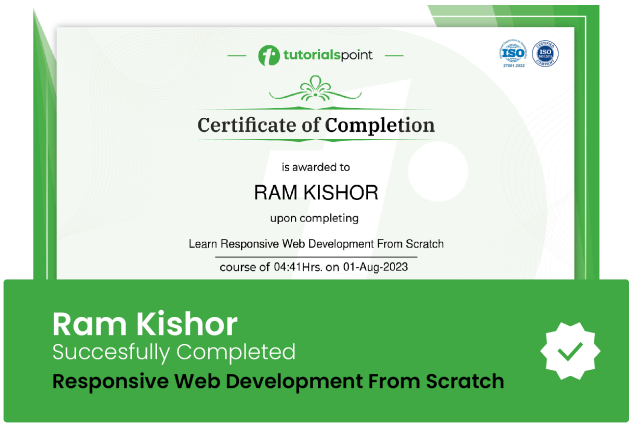pfSense For Dummies: Setup And Configure Your Own Firewall
Learn to Setup pfSense Open Source Firewall, Configurations, Captive Portal etc. in an Actual as well as Virtual Scenario

Lectures -33
Duration -3.5 hours

30-days Money-Back Guarantee
Get your team access to 10000+ top Tutorials Point courses anytime, anywhere.
Course Description
pfSense is an open-source firewall and router distribution based on the FreeBSD operating system. It is highly preferred by businesses and individuals for its high-end features and ease of use.
This online course will help understand everything about pfSense from scratch, from understanding different features and how to configure them to troubleshooting common problems.
pfSense For Dummies: Setup And Configure Your Own Firewall Course Overview
In this course, we'll get started with understanding what a firewall exactly is in sessions 1 and 2. We will discuss the principle underlying a firewall, why should we install pfSense as our firewall and why should we utilize one at all in our network. We will also discuss the unique qualities and attributes of pfSense.
In the third session, we'll look at how to get the pfSense Community Edition from the website and then use that file to make a bootable USB stick that we can use to install pfSense on our computers.
The following session 4 will demonstrate how to add a second Ethernet card to your computer such that the incoming connection enters through the first Ethernet card and the outgoing connection exits through the second Ethernet port.
The network strategy, the devices we will use in the network, and how we can link the devices that we are going to include in our actual network scenario will all be discussed in the upcoming session 5.
From session 6 to session 11, we'll check out how to boot from a bootable USB device before moving on to installing pfSense on our machine. We will also set up the WAN network in addition to the LAN network to have an internet connection that comes from the WAN network, passes through our pfSense, and enters our Local Area Network, or LAN network.
The issue with this type of configuration is that setting up all these devices and networks will make it impossible to quickly understand how to use pfSense. We're going to perform the actual configuration using the exact same lab setup that we had here in the virtual setting.
From sessions 12 to 17, we will attempt to recreate the exact scenario from our physical lab in our virtual setting using VirtualBox. We will download the VirtualBox from the Oracle website. We will also download pfSense Community Edition. We will then download the client computer, Ubuntu, and install pfsense and Ubuntu into virtual machines so that we can have both pfSense and a client computer.
From sessions 18 to 20, we will cover the most popular pfSense console options and configurations. We'll also go through how to customize the Web Dashboard and the Web Wizard that will show up the first time you install it.
From sessions 21 to 27, we will cover the advanced administrative and system configuration options. Also, we'll see the package manager, which allows you to install new packages and obtain new features. We'll also view the gateways, where you can set gateway preferences, and the user manager, which enables you to modify, delete, activate, and deactivate new users. You will also learn about the interface selections, assignments, and port forward, which enables you to use your firewall to forward ports.
In sessions 28 and 29, we will set up and configure one of the nicest features of pfSense, the captive portal. We can set it up so that users must check in to the system using a username and password at places like hotels or schools. Alternatively, you could also make coupon codes. The user can log in to the system with either the username and password or the voucher code to access a metered internet connection.
In session 30, Load balancing is one of the various pfsense features that we shall see. Also, we'll show how crucial it is to back up your settings and restore them both via the online interface and the command line interface.
In sessions 31 and 32, we will install website blocking capability for the entire network with the pfsense plugin, pfblocker. With this plugin, you may block specific websites from a list of websites as well as include individual domain names to block them specifically in the network.
Overall, this course will be a wonderful starting point for your pfSense firewall experience. Also, we will provide you a certificate of completion for the course, which you can add to your portfolio for network administration and strengthen your career prospects.
Who is this course for?
Network Enthusiasts, System Administrators, or Network Administrators who wish to implement firewalls on their premises.
Goals
What will you learn in this course:
- Learn how to install and configure pfSense
- Understand how to create and manage firewall rules
- Learn how to configure NAT and DHCP
- Set up VPNs
- Monitor and troubleshoot your pfSense firewall
Prerequisites
What are the prerequisites for this course?
- No prior experience required. Knowing basic concepts of networking would be an advantage.

Curriculum
Check out the detailed breakdown of what’s inside the course
Introduction - Top 10 Highlights of the Course
1 Lectures
-
Introduction - Top 10 Highlights of the Course 05:24 05:24
Firewall and pfSense Concepts
2 Lectures

Downloading pfSense and Creating Bootable USB Drive
1 Lectures

Installing Additional Network Card in PC
1 Lectures

Making Network Connections : WAN - pfSense - LAN
1 Lectures

Installing pfSense
3 Lectures

DHCP - IP Address Assignment & Resolving Conflicts
1 Lectures

Testing Connectivity and Troubleshooting
1 Lectures

Virtual Box pfSense
4 Lectures

VirtualBox Ubuntu Installation
2 Lectures

PfSense
4 Lectures

PfSense System Options
2 Lectures

PfSense Interfaces
2 Lectures

PfSense - Firewall
2 Lectures

PfSense - Captive Portal
2 Lectures

PfSense - Miscellaneous options including Backup and Restore
1 Lectures

Website Blocking
2 Lectures

Instructor Details

Abhilash Nelson
eCourse Certificate
Use your certificate to make a career change or to advance in your current career.

Our students work
with the Best


































Related Video Courses
View MoreAnnual Membership
Become a valued member of Tutorials Point and enjoy unlimited access to our vast library of top-rated Video Courses
Subscribe now
Online Certifications
Master prominent technologies at full length and become a valued certified professional.
Explore Now


 Updated on Apr, 2024
Updated on Apr, 2024
 Language - English
Language - English